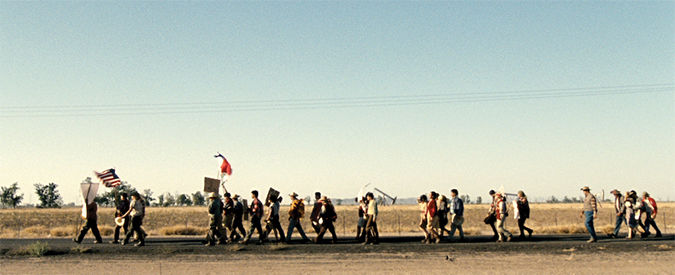“I think film is a great tool of change, definitely,” says popular Mexican actor Diego Luna, whose directing debut “Cesar Chavez” hits theatres Friday.
“I like cinema when it entertains and engages with an audience, but also when you think in terms of where you are and how to make yours a better place,” he said. “I couldn’t spend four years working on a project that doesn’t matter to me. This biz allows you to do that, so why not do something you would be interested in as an audience? I want to please the audience and challenge the audience.”
Luna’s $10 million biopic about the groundbreaking Latino activist who founded the United Farm Workers and greatly improved the living conditions of millions of migrant laborers is the first dramatic feature film ever made about Chavez. Chavez turned down several film offers while he was alive, saying that he wanted the focus to be on the movement rather than himself.
But with 20 years having passed since his death, and the plight of undocumented workers once again hot amid calls for immigration reform, Luna was determined to finally honor the man with a proper film. The result is competent but not very stirring — a problem fueled by the fact that Luna intentionally rejected Hollywood studios’ calls for A-list Latino actors like Antonio Banderas and Andy Garcia to play the iconic Chavez and instead chose relative unknown Michael Pena (“End of Watch”) for the part.
In fact, the movie only covers a decade-long span of Chavez’s life, skipping past his own rough childhood to plant him firmly in his adulthood as a married man with eight boisterous children and focusing on the first 10 years of his union-building efforts, including his nationally renowned 28-day hunger strike for the cause. Leaving out large portions of his life lessens the dramatic scope by reducing the film to a mere 98 minutes when many comparable film biographies about historic figures are about an hour longer.
The movie is also a whitewash in some ways, spotlighting Chavez’s achievements while leaving out widely known weaker traits including paranoia about his fellow leaders’ motivations and tactics, and a frequent temper. It does show him to be a distant father at times due to his devotion to the cause and the frequent travels it required, leaving his oldest teen son to shoulder the travails of new schools and awkward teen years mostly alone.
Exploring some of those facets might have made for a more complex and emotionally compelling film, but Luna appears to have wanted to just spread the word on the basics of the leader’s life in order to have the broadest educational appeal to a new generation of Latino and Mexican immigrants’ children who might not be aware of his story.
“Cesar wanted everything to be about the union, which represented all of them together,” says Luna. “This is about everyone who believed in something bigger. And it was important to play the importance of the movement and women in the movie. His wife Helen didn’t get credit at the time, but she worked, organized, fed the family, and stayed up 20 hours a day to get four hours of sleep and start all over again.”
Indeed, the importance of both Cesar’s wife Helen (America Ferrara) and his fellow union organizer Dolores Huerta (Rosario Dawson) is a key element in the movie. Luna believes that their bedrock support and feminine influence on the cause helped spotlight the needs of female migrant workers, and to gain sympathy from moms on the outside of the movement.
“They achieved an extraordinary thing, connecting consumers with the workers in the fields by making the consumers know they were present and deserved fair working conditions,” says Luna. “I believe that message needs to be out today when there’s more than 11 million people without the same rights as those who use their work. It’s the right movement to send this message: to be a consumer is to share a responsibility for what you are consuming.”
Reflecting on the influence of those women and on Cesar’s family life, Luna noted that it was his own son entering the world five years ago that inspired him to dive so fully into this project.
“My son is 5 years old, but one day he’s going to want to talk about the world and to be what he is,” says Luna. “I want him to know that there was a guy named Cesar Chavez with an amazing movement in the ‘60s and ‘70s, and in fact change is in our hands. And that he has the capability to do what he wants to do. He gave me a better life and that’s why I dedicate it to them.”
Luna has big dreams of his film also reaching workers throughout Central and South America and inspiring them to speak up for their rights as well. But he says that until there is a greater cultural understanding by North American populations of Central and South America, and vice versa, it will be hard to spread the word and build a mass movement that can really make lasting changes.
“Those living south of the border know very little about the Latino experience, of being on the north side of the border, to still be connected but fractured with your past, that duality,” says Luna. “We’ve allowed this border to fracture and separate us, we don’t share our stories. This film is an attempt to build a bridge between both sides. Our strength is in our numbers, so why not try to connect? Change is gonna come so we gotta get involved. Get outside and find those who think like us, and we can win. We’re not alone, so we can’t let indifference run our lives.”

